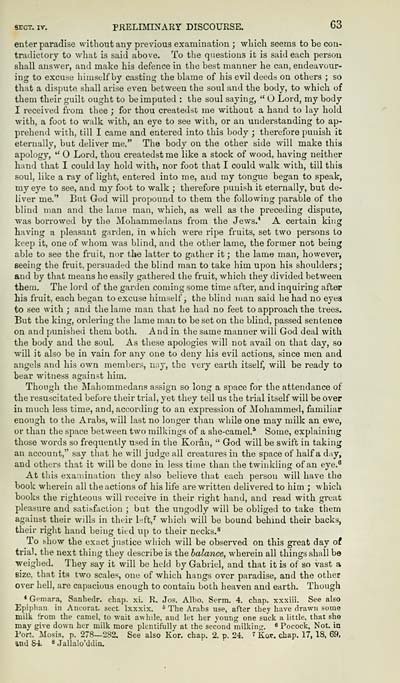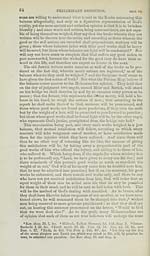Download files
Complete book:
Individual page:
Thumbnail gallery: Grid view | List view

SECT. IV. PRELIMINARY DISCOURSE. 63
enter paradise without any previous examination ; wliicli seems to be con-
tradictory to what is said above. To tlie questions it is said each person
shall answer, and make his defence in the best manner he can, endeavour-
ing to excuse himself by casting' the blame of his evil deeds on others ; so
that a dispute shall arise even between the soul and the body, to which of
them their guilt ought to be imputed : the soul saying, " O Lord, my body
I received from thee ; for thou createdst me without a hand to lay hold
with, a foot to walk with, an eye to see with, or an understanding to ap-
prehend with, till I came and entered into this body ; therefore punish it
eternally, but deliver me." The body on the other side will make this
apology, " O Lord, thou createdst me like a stock of wood, having neither
hand that I could lay hold with, nor foot that I could walk with, till this
soul, like a ray of light, entered into me, and my tongue began to speak,
my eye to see, and my foot to walk ; therefore punish it eternally, but de-
liver me." But God will propound to them the fuUowing parable of the
blind man and the lame man, which, as well as the preceding dispute,
•was borrowed by the Mohammedans from the Jews.* A certain king
having a pleasant garden, in which were ripe fruits, set two persons to
keep it, one of whom was blind, and the other lame, the former not being
able to see the fruit, nor the latter to gather it ; the lame man, however,
seeing the fruit, persuaded the blind man to take him upon his shoulders;
and by that means he easily gathered the fruit, which they divided between
them. The lord of the garden coming some time after, and inquiring after
his fruit, each began to excuse himself, the blind man said he had no eyes
to see with ; and the lame man that he had no feet to approach the trees.
But the king, ordering the lame man to be set on the blind, passed sentence
on and punislied them both. And in the same manner will God deal with
the body and the soul. As these apologies will not avail on that day, so
Avill it also be in vain for any one to deny his evil actions, since men and
angels and his own members, nay, the very earth itself, will be ready to
bear witness against him.
Though the Mahommedans assign so long a space for the attendance of
the resuscitated before tlieir trial, yet they tell us the trial itself will be over
in much less time, and, according to an expression of Mohammed, familiar
enough to the Arabs, will last no longer than while one may milk an ewe,
or than the space between two railkings of a she-camel.* Some, explaining
those words so frequently used in tiie Koran, " God will be swift in taking
an account," say tliat he will judge all creatures in the space of half a day,
and othei's that it will be done in less time than the twinkling of an eye."
At this examination they also believe that each persou will have the
book wherein all the actions of his life are written delivered to him ; which
books the righteous will receive in their right hand, and read with great
pleasure and satisfiiction ; but the ungodly will be obliged to take them
against their wills in their UitJ which will be bound behind their backs,
their right hand being tied up to their necks.^
To show the exact justice which will be observed on this great day of
trial, the next thing they describe is the balance, wherein all things shall be
weighed. They say it will be held by Gabriel, and that it is of so vast a
size, that its two scales, one of which hangs over paradise, and the other
over hell, are capacious enough to contain both heaven and earth. Though
* Gomara, Sanhedr. chap. xi. R. Jos. Albo, Sorm. 4. chap, xxxiii. See also
Epiphan in Ancorat. sect Ixxxix. « The Arabs use, after they have drawn some
milk from the camel, to wait awhile, and let her young one suck a little, that she
may give down her milk more plentifully at the second milkinjj. « Pocock, Not. in
Port. Mosis, p. 278—282. See also Kor. chap. 2. p. 24. ^ Kor. chap. 17, 18. 69.
and 84. * Jallalo'ddio.
enter paradise without any previous examination ; wliicli seems to be con-
tradictory to what is said above. To tlie questions it is said each person
shall answer, and make his defence in the best manner he can, endeavour-
ing to excuse himself by casting' the blame of his evil deeds on others ; so
that a dispute shall arise even between the soul and the body, to which of
them their guilt ought to be imputed : the soul saying, " O Lord, my body
I received from thee ; for thou createdst me without a hand to lay hold
with, a foot to walk with, an eye to see with, or an understanding to ap-
prehend with, till I came and entered into this body ; therefore punish it
eternally, but deliver me." The body on the other side will make this
apology, " O Lord, thou createdst me like a stock of wood, having neither
hand that I could lay hold with, nor foot that I could walk with, till this
soul, like a ray of light, entered into me, and my tongue began to speak,
my eye to see, and my foot to walk ; therefore punish it eternally, but de-
liver me." But God will propound to them the fuUowing parable of the
blind man and the lame man, which, as well as the preceding dispute,
•was borrowed by the Mohammedans from the Jews.* A certain king
having a pleasant garden, in which were ripe fruits, set two persons to
keep it, one of whom was blind, and the other lame, the former not being
able to see the fruit, nor the latter to gather it ; the lame man, however,
seeing the fruit, persuaded the blind man to take him upon his shoulders;
and by that means he easily gathered the fruit, which they divided between
them. The lord of the garden coming some time after, and inquiring after
his fruit, each began to excuse himself, the blind man said he had no eyes
to see with ; and the lame man that he had no feet to approach the trees.
But the king, ordering the lame man to be set on the blind, passed sentence
on and punislied them both. And in the same manner will God deal with
the body and the soul. As these apologies will not avail on that day, so
Avill it also be in vain for any one to deny his evil actions, since men and
angels and his own members, nay, the very earth itself, will be ready to
bear witness against him.
Though the Mahommedans assign so long a space for the attendance of
the resuscitated before tlieir trial, yet they tell us the trial itself will be over
in much less time, and, according to an expression of Mohammed, familiar
enough to the Arabs, will last no longer than while one may milk an ewe,
or than the space between two railkings of a she-camel.* Some, explaining
those words so frequently used in tiie Koran, " God will be swift in taking
an account," say tliat he will judge all creatures in the space of half a day,
and othei's that it will be done in less time than the twinkling of an eye."
At this examination they also believe that each persou will have the
book wherein all the actions of his life are written delivered to him ; which
books the righteous will receive in their right hand, and read with great
pleasure and satisfiiction ; but the ungodly will be obliged to take them
against their wills in their UitJ which will be bound behind their backs,
their right hand being tied up to their necks.^
To show the exact justice which will be observed on this great day of
trial, the next thing they describe is the balance, wherein all things shall be
weighed. They say it will be held by Gabriel, and that it is of so vast a
size, that its two scales, one of which hangs over paradise, and the other
over hell, are capacious enough to contain both heaven and earth. Though
* Gomara, Sanhedr. chap. xi. R. Jos. Albo, Sorm. 4. chap, xxxiii. See also
Epiphan in Ancorat. sect Ixxxix. « The Arabs use, after they have drawn some
milk from the camel, to wait awhile, and let her young one suck a little, that she
may give down her milk more plentifully at the second milkinjj. « Pocock, Not. in
Port. Mosis, p. 278—282. See also Kor. chap. 2. p. 24. ^ Kor. chap. 17, 18. 69.
and 84. * Jallalo'ddio.
Set display mode to: Large image | Transcription
Images and transcriptions on this page, including medium image downloads, may be used under the Creative Commons Attribution 4.0 International Licence unless otherwise stated. ![]()
| Early Gaelic Book Collections > J. F. Campbell Collection > Koran: or, Alcoran of Mohammed > (85) |
|---|
| Permanent URL | https://digital.nls.uk/77135030 |
|---|
| Description | Volumes from a collection of 610 books rich in Highland folklore, Ossianic literature and other Celtic subjects. Many of the books annotated by John Francis Campbell of Islay, who assembled the collection. |
|---|
| Description | Selected items from five 'Special and Named Printed Collections'. Includes books in Gaelic and other Celtic languages, works about the Gaels, their languages, literature, culture and history. |
|---|

